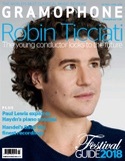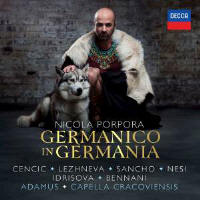Texte paru dans: / Appeared in: |
|
|
Outil de traduction (Très approximatif) |
|
|
Reviewer:
Richard Wigmore Nicola Porpora was long famous by association rather than through his own music. In the early 1750s he was mentor to the young Haydn, who for a time also served as his valet. Three decades earlier he had taught the castratos Farinelli and Caffarelli, while his peripatetic operatic career included a spell as rival to Handel in London. The human voice was his speciality. And it is is hardly surprising that the Neapolitan composer-cumteacher, at the height of his fame in the 1720s and ’30s, knew exactly how to display his singers’ technical prowess to optimum effect. Germanico in Germania, the first complete Porpora opera on disc, is an eloquent case in point. Premiered in Rome in 1732, the opera centres on the conflict between Germanico, Roman commander in feudal Germania, and the proudly independent Germanic chieftain Arminio. Further complications arise from the Roman allegiance of the chieftain Segeste, whose elder daughter Rosmonda is Arminio’s wife. Predictably, all comes right in the end, with a 12th-hour reconciliation (dealt with in two minutes of secco recitative) and a final ensemble hymning the future union of the Rhine and the Tiber. That the action can be creaky and the characterisation two-dimensional would not have bothered Porpora’s Roman audiences one iota. What they came to see, and got in abundance, was a celebration of vocal virtuosity from an all-male cast (women being banned by papal edict) featuring two of the leading castratos of the day: Domenico Annibali in the title-role (he would later sing the title-role in Handel’s Arminio) and, as his antagonist Arminio, Caffarelli, who even by castrato standards was something of a colleaguefrom-hell. While bravura brilliance can occasionally become an end in itself, and some of the arias sound too jolly and/or mellifluous for the situation, Porpora’s invention rises well above Italian Baroque routine. Reflecting the singers’ star billing in 1732, Germanico and Arminio have some of the finest, certainly the fieriest, music. This recording was planned in part as a showcase for the countertenor Max Emanuel Cencic, who tosses off Germanico’s seething ‘rage’ aria ‘Qual turbine’ with devil-may-care virtuosity and reveals the full beauty and depth of his tone in the introspective ‘Nasce da valle impura’, one of the opera’s few slow arias. Mary-Ellen Nesi is his equal in swaggering brilliance, using the bright blade in her mezzo to thrilling effect in Arminio’s vehement denunciations of Germanico – and never mind the odd moment when her singing teeters on the edge of wildness. Invariably expressive with words, Nesi effectively softens her tone for the touching aria of parting in Act 2, one of the score’s jewels. The other singers are all up to the composer’s virtuoso demands, though neither the impressive soprano Dilyara Idrisova as Rosmonda nor Julia Lezhneva as her younger sister Ersinda entirely avoid the trap of making their coloratura sound like a mechanical vocalise. More distinct words from both would have helped. In her defence, Idrisova’s despairing accompanied recitative and aria with obbligato horn at the end of Act 1 are superbly vivid. The bell-like soprano Hasnaa Bennani (dazzlingly agile in another horn-fuelled aria) makes her mark as Cecina, the Roman captain in love with Ersinda, and Juan Sancho brings a clean, no-nonsense tenor and plenty of temperament to Segeste’s combustible arias.
Jan Tomasz Adamus’s direction of the Kraków period orchestra (including raucous,
high-testosterone horns) is stronger on energy than subtlety, though the players
are not ideally served by a rather dry, close acoustic. Some of the tempos, not
least in Ersinda’s joyful reunion aria ‘Sorge dall’onde’, sound remorselessly
driven, and the singers’ ornamentation can go way over the top. But you could
argue that this is all in keeping with an art form predicated on excess.
Performed with such virtuoso aplomb, above all by Cencic and Nesi, Germanico
in Germania well justifies the booklet’s billing as ‘a veritable feast of
vocal delights ripe for resurrection’. |
|




